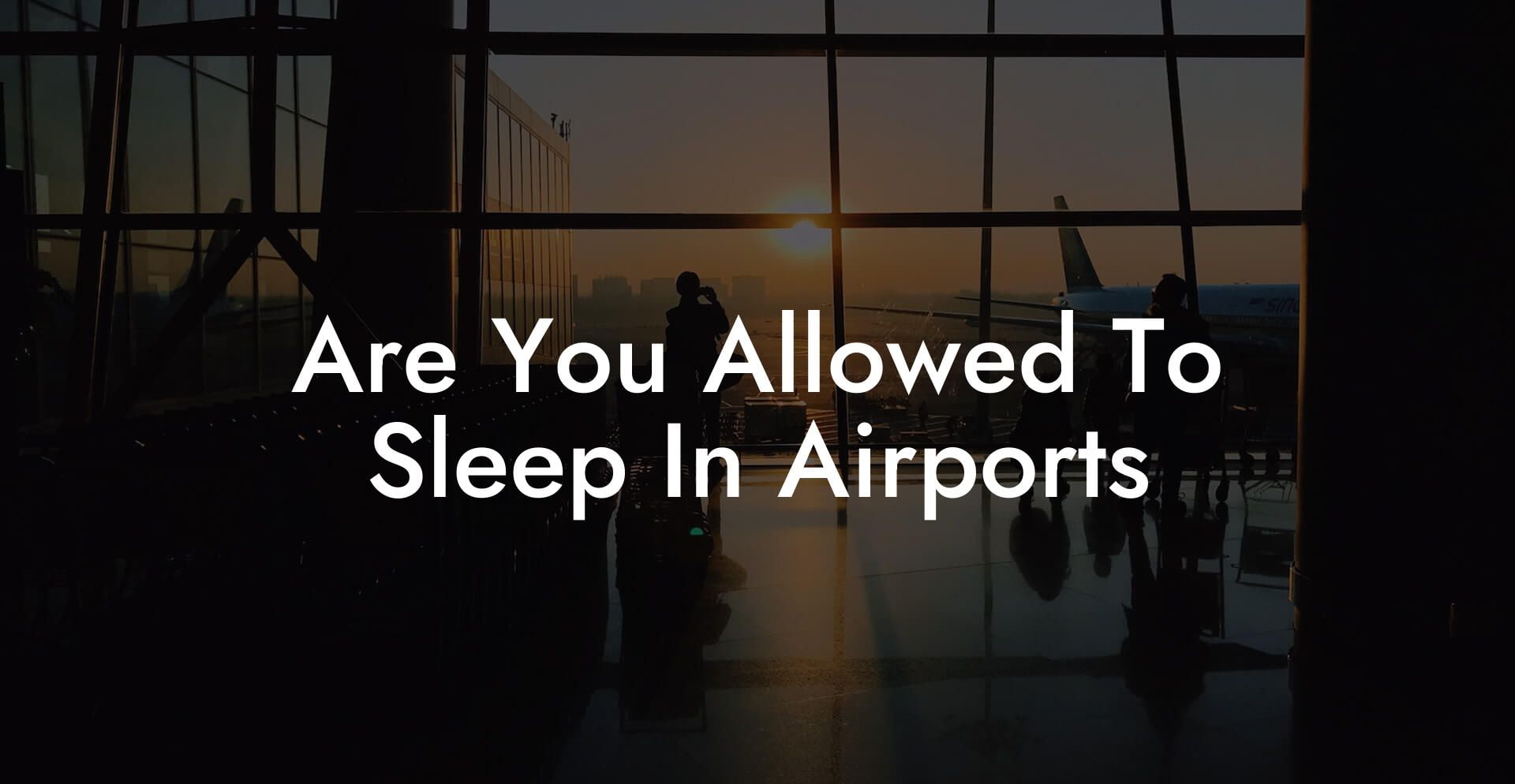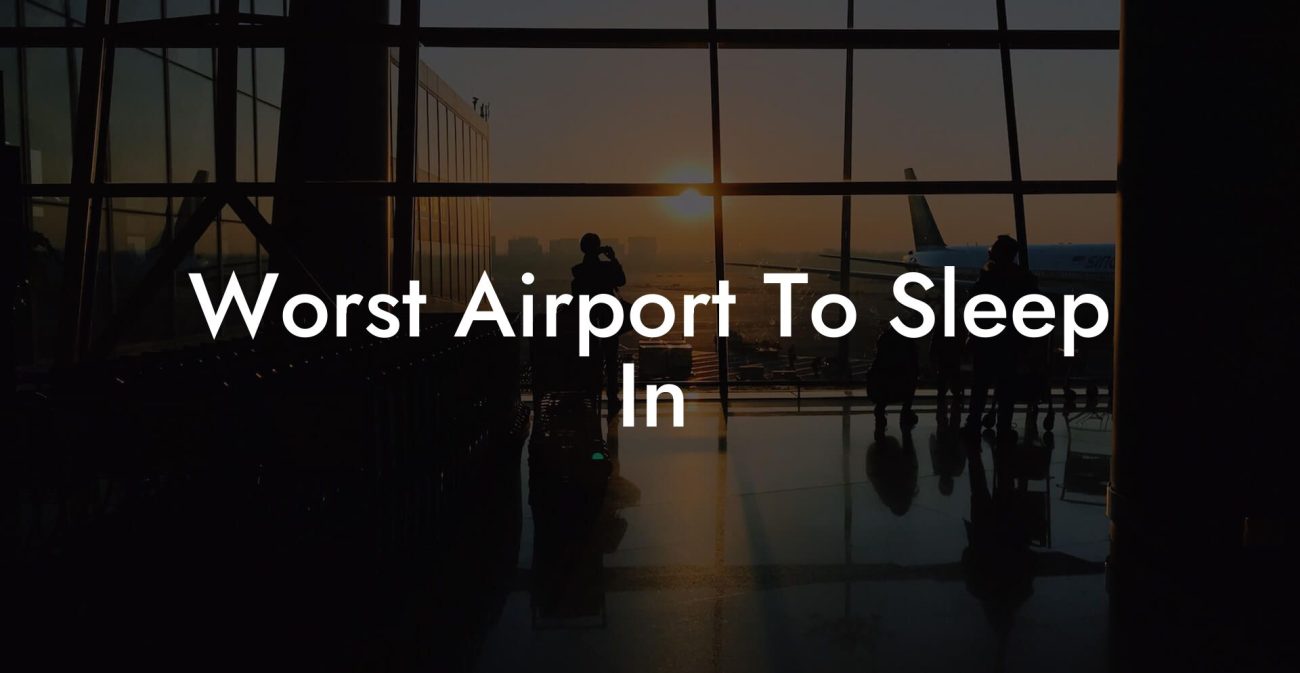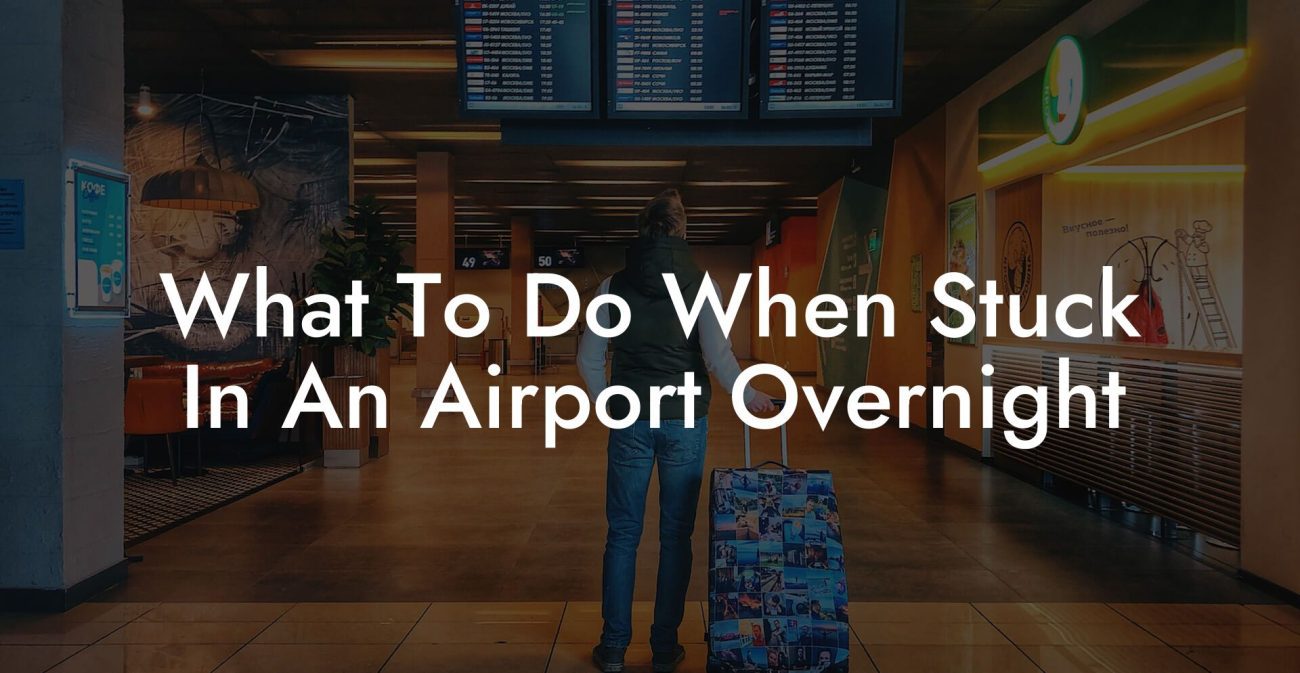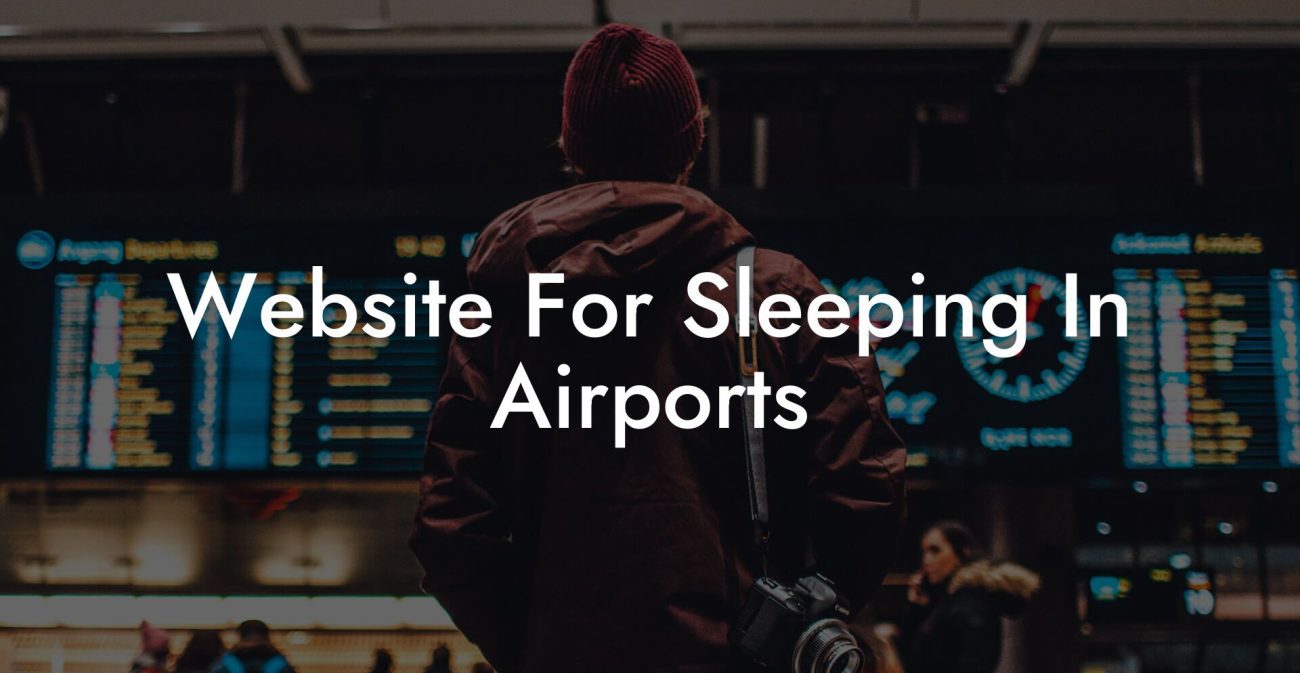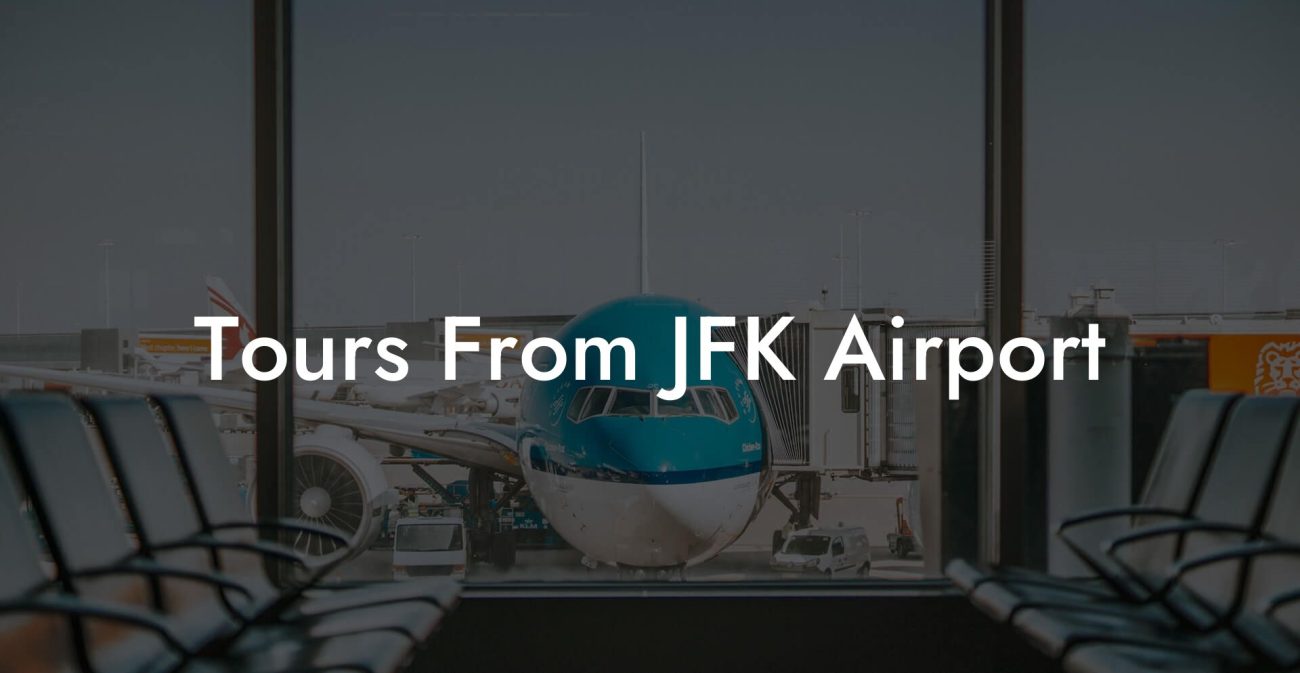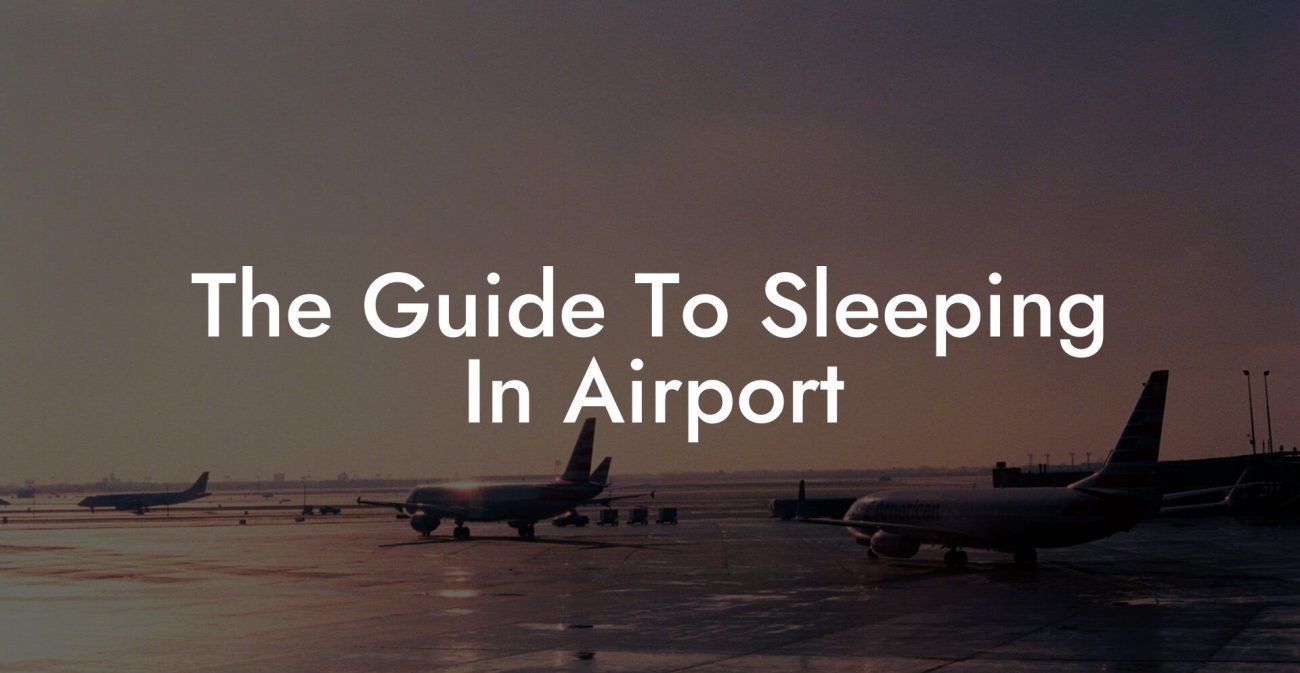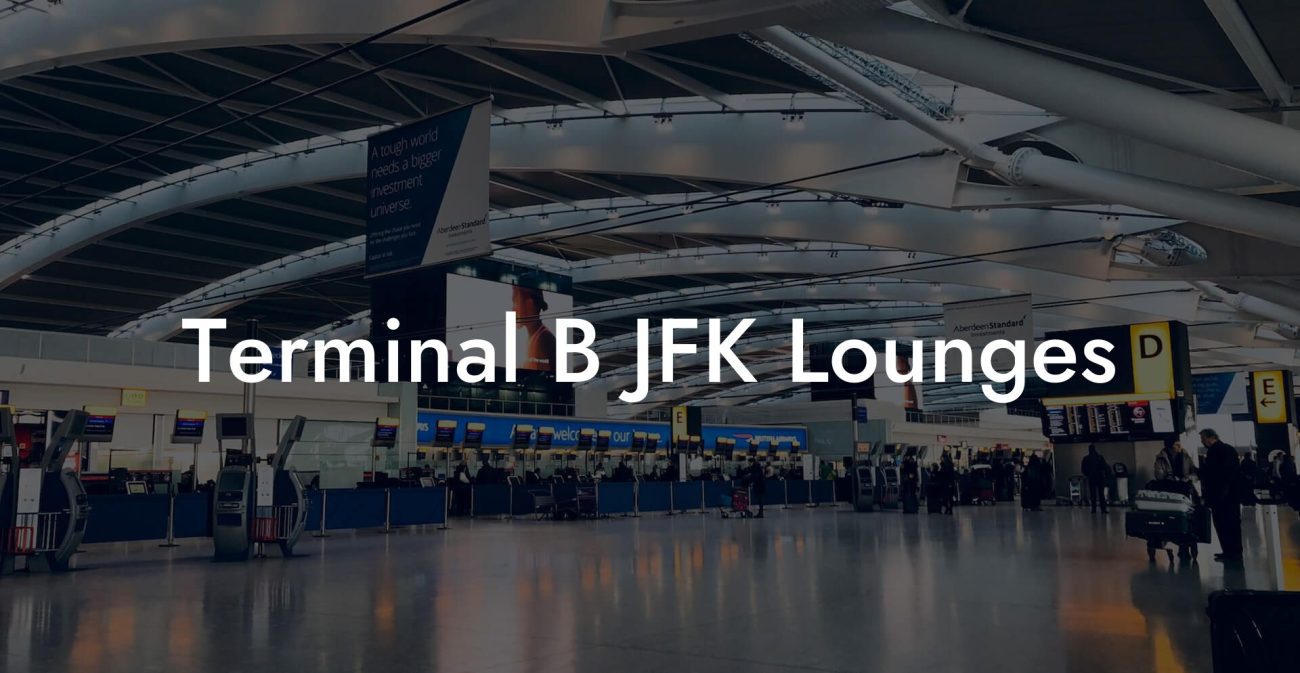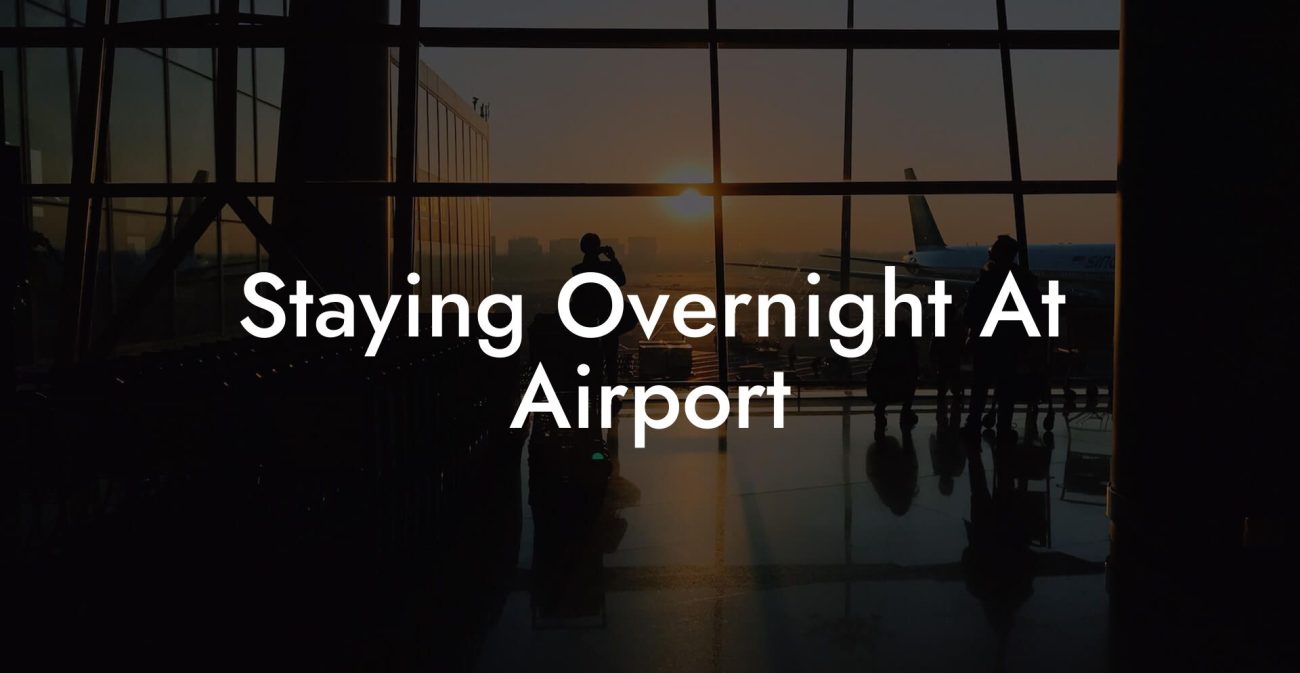Ever found yourself pacing an airport terminal at 2 AM, wondering if stealing a few zzz’s between gates is as scandalous as it sounds or just a necessary hack for the ultimate travel flex? In a world where Gen-Z and millennials are redefining comfort and adventure, sleeping in airports has become an art form—a blend of ingenuity, hustle, and just a pinch of rebellious charm. Get ready to dive into the nitty-gritty of airport snoozing, from the unspoken do’s and don’ts to the high-tech allure of airport sleeping pods. This isn’t your typical travel banter—it’s a deep-dive into the sleeping strategies that ensure you wake up refreshed (or at least less grumpy) before your next adventure.
Quick Links to Useful Sections
- What Does It Really Mean To sleep In An Airport?
- Are You Allowed To Sleep In Airports? The Legal Lowdown
- Airport Sleeping Policies: Know Before You Snooze
- Finding the Perfect Nook: Tips for a Decent Airport Snooze
- High-Tech Haven: Exploring Airport Sleeping Pods
- Tech Tips: Gadgets and Apps That Enhance Your Airport Sleep Experience
- Safety and Security: How to Sleep Soundly (and Safely) in Airports
- Real-Life Stories: Millennial and Gen-Z Airport Sleep Experiences
- Budget-Friendly Hacks: Maximizing Comfort Without Breaking the Bank
- Do’s and Don’ts of Airport Sleeping: Etiquette to Elevate Your Experience
- Preparing for an Overnight Airport Stay: Practical Steps for the Unexpected
- Resources and Community Support: Your Next Steps
- Frequently Asked Questions: Airport Sleeping Edition
- Your Journey to Airport Sleep Mastery
What Does It Really Mean To sleep In An Airport?
At first glance, the idea might conjure images of dodgy countertops, dubious blankets, and a symphony of snores at midnight. But let’s set the record straight—sleeping in an airport isn’t inherently sketchy. For many, it’s a practical solution to layovers, long delays, or even last-minute flight changes when that hotel reservation falls through. In the sprawling, fluorescent-lit terminals of modern airports, you can discover surprisingly comfortable nooks and even premium sleeping pods that combine privacy with tech-savvy convenience.
The fresh generation of travelers is rewriting the rulebook on airport sleep. Gone are the days when crash-landing on a hard bench meant you’d be roped into the tabloids. Today, there’s a blend of ancient travel wisdom and modern innovations at play. Whether you’re a digital nomad in transit, a budget backpacker, or simply someone who values the time saved by skipping a hotel check-in, knowing your rights and how to optimize your airport sleeping experience is essential.
Sleeping in an airport is as much about savvy life hacks as it is about disruption of your usual beauty sleep routine. It’s a survival guide for the jet-setter, a blueprint to maximize your travel efficiency without compromising on rest or style.
Are You Allowed To Sleep In Airports? The Legal Lowdown
Let’s address the burning question: Is it legal to snooze in an airport? The short answer: yes, you can sleep in many airports—though it isn’t always a free-for-all. While most airports don’t have laws explicitly banning sleep, the policies can vary depending on the terminal, the time of day, and even the specific airport’s vibe. Some terminals welcome tired travelers with designated quiet zones and sleeping pods, while others might gently—or not so gently—nudge you towards a more “active” use of the space.
In many airports around the globe, the assumption is that you are indeed there to sleep if you’ve boarded a flight. However, if you plan on camping out for an extended period or setting up a makeshift bed in a non-designated area, be prepared for a bit of side-eye from security or airport staff. Always check the airport’s website or inquire upon arrival about their specific sleeping policies. If you can catch a wink of sleep in a designated lounge or a comfortable seating area, you’re golden.
It’s also important to note that local regulations and airport security protocols play a huge role. Countries with stringent security measures might limit overnight stays strictly to ticketed passengers, while more liberal hubs might offer extended facilities for transit passengers. So, if you’re plotting that midnight siesta in Terminal C, a little pre-flight research can save you from an awkward late-night chat with security.
Airport Sleeping Policies: Know Before You Snooze
Much like mastering any unconventional lifestyle hack, moderation and knowledge are key. Airport sleeping policies can differ widely—not just from country to country, but even from one terminal to another within the same airport. Some airports have embraced the notion of “rest zones,” complete with reclining chairs, charging stations, and an overall zen vibe. Others might restrict overnight stays outside of paid lounges or sleeping pods.
Before you head to the airport with dreams of an impromptu nap fest, consider these guidelines:
- Know the Layout: Airports can be labyrinths. Familiarize yourself with the terminal map to identify rest zones, quiet areas, or designated sleeping pods.
- Time It Right: Some areas might be open 24/7, while others shut down after a certain hour. Check their operational policies to avoid any unpleasant surprises.
- Respect the Rules: If you’re in a public area, keep your gear tidy, stay in approved zones, and be polite if approached by staff.
- Ask for Help: Don’t hesitate to inquire at an information desk about the best spots to rest. The staff might point you to a hidden gem or a dedicated relaxation area.
Mastering these details not only makes your layover more comfortable, but it also lets you sleep soundly knowing you’re playing by the rules. It’s about blending a bit of rebellion with a hefty dose of respect for the space and the other jet-lagged travelers sharing it with you.
Finding the Perfect Nook: Tips for a Decent Airport Snooze
Let’s get practical. After all, even the best-laid sleeping plans can go off the rails without a solid strategy. Here are some hacks for securing the most comfortable sleep spot in any airport, tailored especially for the savvy Gen-Z and millennial traveler:
Scout for Comfort Zones: Modern airports tend to have zones dedicated to rest. Look for “sleeping zones,” lounges (even if pay-per-use), or quiet corners barricaded with modern art and calming light fixtures.
Bring the Essentials: A lightweight travel pillow, a compact blanket, or even a pair of high-quality noise-cancelling headphones can elevate your airport sleep game from “meh” to “majestic.” Don’t forget an eye mask if those harsh fluorescent lights are a problem.
Layer Up: Temperature control can be unpredictable. Layered clothing allows you to adjust on the fly without having to resign yourself to a morning chill or sweaty discomfort.
Keep Your Belongings Close: Investing in a small travel safe or simply keeping your gear within reach is crucial. More than your comfort, personal safety is a priority—especially when you’re in an unfamiliar corner of the world.
Embrace the Art of the Power Nap: Sometimes, the idea isn’t to have a full-blown eight-hour slumber but rather a strategic power nap that resets your system. A 20-30 minute burst of sleep can rejuvenate your mind and help you avoid the dreaded grogginess.
Each of these tips is designed to optimize your comfort and ensure you’re not only abiding by airport rules but also maximizing every minute of rest. Remember, in the world of airport sleep, clever preparation is your best traveling buddy.
High-Tech Haven: Exploring Airport Sleeping Pods
If the idea of lying on a hard plastic bench makes you cringe, then airport sleeping pods might just be your saving grace. These high-tech sanctuaries are designed with the modern traveler in mind, offering a blend of comfort, security, and privacy that’s hard to beat.
What Are Sleeping Pods? In simple terms, airport sleeping pods are small, enclosed spaces that provide obstacles between you and the buzz of the terminal. Often equipped with adjustable lighting, charging ports, and sometimes even soundproofing features, these pods are a mini oasis in the vast concrete jungle of airport architecture.
The Appeal for Gen-Z and Millennials: Eschewing the traditional hotel room in favor of a few hours in a sleek sleeping pod is both a bold statement and a practical solution. They embody the principles of minimalism, convenience, and the ingenious repurposing of space—a perfect match for those who value both tech and thrift.
Booking a Pod: Many airports now offer these pods on a pay-per-use basis. Apps and kiosks make booking quick and hassle-free, and if you’re traveling at the last minute, they’re usually available on demand. It’s the boutique accommodation experience without the hotel tax.
Comfort Meets Security: Besides a comfortable setup, sleeping pods are often located in secure areas of the airport, reducing concerns about personal safety. For weary travelers, this means they can drift off with one eye open, knowing they’re in a designated rest area.
For those who see sleeping as a vital part of travel salvage, these pods offer a futuristic twist on age-old methods of catching a quick nap. They combine modern luxury with convenience, proving that sometimes the best flight upgrade isn’t in the sky, but right on the ground.
Tech Tips: Gadgets and Apps That Enhance Your Airport Sleep Experience
In the ever-connected world of Gen-Z and millennials, technology plays a pivotal role in every aspect of life—even when it comes to catching some shut-eye in an airport. With the right suite of gadgets and apps, you can transform a drab terminal into your personal sleep sanctuary.
Noise-Cancelling Headphones: Whether it’s the roar of intercom announcements or the ambient chatter of fellow travelers, a good pair of noise-cancelling headphones can create an oasis of silence. Try pairing them with a selection of chill playlists or ambient soundscapes to drift off smoothly.
Sleep Apps: There’s a treasure trove of sleep and meditation apps designed to help you relax, track your sleep patterns, and even gently shake you awake at the optimal moment. Many of these apps include guided meditations, ambient sound mixers, and even white noise generators that work wonders in bustling environments.
Portable Chargers and Multi-Port Outlets: When you’re plugged into a sleeping pod or your favorite airport bench, keep your devices juiced up and ready for the next leg of your journey. A portable charger ensures that your life-supporting gadgets are powered, letting you bring your favorite sleep app along for the ride.
Smart Lighting: Some advanced sleeping pods come equipped with smart lighting systems that simulate a natural sleep-wake cycle. For travelers prone to jet lag, adjusting your body clock with these subtle light cues can drastically improve your sleep quality.
It’s all about turning that underwhelming airport environment into a tech-enhanced retreat. With a little digital magic, you can create a space that’s as much about resting as it is about recharging—both your devices and your body.
Safety and Security: How to Sleep Soundly (and Safely) in Airports
Let’s face it: while a cozy nap in a sleeping pod or a quiet corner might seem idyllic, safety should always be at the forefront when you’re sleeping in public. Balancing comfort with security might seem like a tightrope walk, but don’t worry—we’ve got you covered with practical tips that ensure your snooze doesn’t turn into a rookie mistake.
Stay Alert: Even when you’re asleep, it’s wise to remain semi-aware of your surroundings. Use a sleep timer or an alarm that gives you a soft reminder to check your belongings periodically.
Secure Your Stuff: Always keep your valuables close. Consider using a travel lock for your bag or investing in a portable eye-safe travel safe where you can secure your electronics and passport.
Travel Light but Wise: While bringing everything might be tempting, try to limit your belongings during these sleep sessions. Keep just the essentials with you so that your sleeping area remains as uncluttered and secure as possible.
Trust Your Instincts: If a location feels off—be it poor lighting, too much foot traffic, or an uncomfortable vibe—it’s best to relocate. The airport is vast, and there’s usually an alternative spot that offers a safer, more restful environment.
Check-In With Airport Staff: Don’t be shy about asking airport or lounge staff for advice on safe areas to rest. Their insider knowledge can lead you to designated sleeping zones or even recommended spots to avoid.
These safety pointers are designed to help you strike the perfect balance between rest and security, ensuring that your airport sleep is as peaceful as it is protected.
Real-Life Stories: Millennial and Gen-Z Airport Sleep Experiences
Sometimes the best way to learn is to hear firsthand accounts of those who’ve been there and done that. From epic sleep hacks to less-than-glamorous reality checks, real-life stories offer a sprinkle of humor, a dash of reality, and a whole lot of inspiration.
Consider the tale of Alex—a freelance digital nomad who found himself stranded in a mid-sized European airport during a winter storm. Armed with a trusty travel pillow, a pair of noise-cancelling headphones, and a plethora of downloaded sleep tunes, Alex secured a spot near a charging station in a designated “quiet lounge.” His impromptu nap not only recharged his energy but also led to an unexpected bonding session with fellow stranded travelers that resulted in lifelong connections and epic travel hacks.
Then there’s Jasmine, a millennial influencer known for her candid travel vlogs. During a long layover in a bustling Asian airport, she experimented with an airport sleeping pod. Her social media posts captured her journey from hesitant skeptic to full-blown believer in high-tech rest zones. Jasmine’s experience became a viral sensation, sparking a trend among her followers to explore similar sleeping pod options in other major hubs.
Stories like these remind us that airport sleep isn’t just about catching a few extra winks—it’s about embracing the unexpected and finding comfort in the chaos of travel. Every traveler’s experience is unique, and these real-life anecdotes are a testament to the creativity and resilience inherent in those who dare to sleep under the fluorescent glow of an airport terminal.
Budget-Friendly Hacks: Maximizing Comfort Without Breaking the Bank
Let’s be honest—it’s not every traveler who can splurge on a private corner or a swanky sleeping pod. The real magic happens when you can transform a stodgy airport bench into your personal nap haven on a shoestring budget. Here are some creative tips for those who crave comfort without the luxury price tag:
DIY Comfort Kit: Pack a lightweight travel pillow, a blanket, and a compact, foldable eye mask. Add a pair of earbuds for ambient sound or your favorite sleep podcast, and you’re set for an impromptu lounge transformation.
Explore Free Lounges: Some credit cards and loyalty programs offer free access to basic lounges. Even if it’s just a comfortable seating area with complimentary snacks, these lounges provide a more secure and quiet environment than the general terminal.
Timing is Everything: Early morning or late-night flights often see empty terminals with plenty of space. Choose these off-peak hours to score the comfiest spots with minimal disturbance.
Scour Social Media: Use platforms like Instagram or local forums to scout out followers’ recommendations. Many travelers share hidden gems and underrated areas in lesser-known terminals. You might even find a pop-up rest zone you never knew existed.
Layer Your Comfort: Instead of hefty travel gear, invest in multi-use items such as an all-in-one travel blanket that can double as a pillow or a portable seat cushion that turns hard chairs into surprisingly comfy nests.
With these budget-friendly hacks, you’re not just surviving the layover—you’re conquering it with creativity and a flair for resourcefulness that’s perfectly in tune with the millennial and Gen-Z spirit.
Do’s and Don’ts of Airport Sleeping: Etiquette to Elevate Your Experience
When it comes to sleeping in airports, etiquette is your best friend. Balancing personal comfort with communal respect can set the tone for a harmonious sleep experience in the midst of a bustling terminal.
Do – Stay Tidy: Keep your sleeping area neat. Use a bag or a backpack as a makeshift footrest, and avoid spreading your belongings too far—which protects your space and shows respect to others.
Do – Be Mindful of Others: Softly play your sleep sounds at a reasonable volume and be aware of shared spaces. If someone needs extra light or space, a friendly nod goes a long way.
Do – Check Local Policies: Before making yourself too comfortable, a quick glance at the airport’s guidelines can prevent any awkward run-ins with security or staff.
Don’t – Overstay Your Welcome: While an impromptu layover nap is fine, extending your stay beyond permitted hours in restricted areas might get you politely escorted out or, worse, flagged for security reasons.
Don’t – Create a Nuisance: This means no loud conversations, no impromptu parties, and definitely no hogging all the power outlets. You’re there to sleep, not stage a rave.
Do – Blend In: Dress in layers and adopt a low-key manner. In the diverse world of airport travelers, looking like everyone else going through a similar struggle is half the battle.
These do’s and don’ts aren’t just guidelines; they’re the unsung rules that help maintain the delicate balance between personal comfort and public courtesy in the hectic environment of an airport.
Preparing for an Overnight Airport Stay: Practical Steps for the Unexpected
Sometimes, even the most meticulously planned trips can run into unforeseen delays. Whether your flight’s grounded due to weather or you’re caught in a scheduling snafu, preparing for an overnight airport stay can make all the difference.
Create a Sleep Survival Kit: Fill it with essentials like a travel pillow, a light blanket, extra socks, an eye mask, and even a spare set of underwear. Little comforts go a long way in transforming a cold, sterile terminal into a pop-up haven.
Know Your Terminal’s Layout: If you find yourself stranded overnight, knowing where restrooms, lounges, charging stations, and security desks are located can streamline your escape from discomfort.
Set Up a Communication Plan: Inform a friend or family member about your delay. This not only puts your loved ones at ease but can also help in coordinating a pickup if things get stretched.
Plan for the Morning Rush: Even if you’re asleep, set an alarm to wake you up with plenty of time to navigate security and catch an early flight. A well-timed wake-up call keeps you from the stress of a missed connection.
Mental Preparation: Sometimes, the thought of sleeping in an airport isn’t mentally appealing. Adjust your mindset by viewing it as part of the adventure—a unique chapter in your travel story rather than an inconvenience.
Taking these practical steps ensures that even when plans go awry, you’re prepared to handle the situation like the resourceful, adventurous traveler you are.
Resources and Community Support: Your Next Steps
The journey to mastering the art of airport sleep doesn’t have to be a solitary one. The travel community is a treasure trove of tips, tricks, and shared experiences that can transform your transit time into quality downtime. From online forums to dedicated travel blogs and social media groups, there’s an entire network of fellow adventurers who’ve got your back.
Travel Forums and Websites: Platforms like Reddit’s r/travel and Lonely Planet’s Thorn Tree are brimming with real-life advice. Whether it’s spotting a hidden lounge or troubleshooting the quirks of a particular airport’s layout, these communities offer invaluable insights.
Mobile Apps: Several apps cater specifically to the needs of transit travelers. Look for apps that not only map out the best sleeping spots inside the terminal but also provide real-time updates on delays, lounge availability, and even user reviews of the best napping zones.
Local Airport Lounges: Do some pre-trip research. Many airports now partner with travel clubs or loyalty programs to offer discounted or free lounge access. These lounges often feature comfortable seating, ample charging ports, complimentary snacks, and an ambiance that’s more conducive to rest.
Social Media Groups: Connect with like-minded travelers on platforms like Facebook or Instagram. Join groups focused on budget travel, airport hacks, or digital nomad lifestyles. You never know when a fellow traveler’s tip might save you from an uncomfortable layover.
Local Support Services: In larger hubs, some airports even provide transit hotels or designated nap zones. Don’t hesitate to inquire at customer service desks about what’s available in the terminal.
Leveraging these resources transforms your airport sleep experience from a solo challenge into a community-supported adventure. The next time you’re facing a long layover, remember that you’re not alone—there are countless seasoned travelers ready to help guide you.
Frequently Asked Questions: Airport Sleeping Edition
Curious about the ins and outs of airport sleeping? We’ve compiled a list of the most common questions we get, along with answers that cut through the noise—perfect for those who need the quick, no-nonsense scoop.
1. Is it legal to sleep in an airport?
Yes, in most airports, it is legal to sleep. However, policies vary between terminals and airports, so be sure to check local guidelines and airport rules before settling down for a nap.
2. Can I book a sleeping pod if I’m not flying immediately?
Many airports offer sleeping pods on a pay-per-use basis, regardless of your flight status. It’s best to check availability in advance as some pods may require proof of travel.
3. Are airport lounges a good alternative for sleeping?
Absolutely! Many airport lounges provide quiet zones, comfortable seating, and amenities geared toward relaxation. Some lounges even offer day passes for those without elite status.
4. What should I pack in my airport sleep survival kit?
Essentials include a travel pillow, a lightweight blanket, eye mask, earplugs or noise-cancelling headphones, and a small travel safe or secure bag for your valuables.
5. How can I stay safe while sleeping in an airport?
Choose well-lit, designated rest areas, keep your belongings close, and be aware of your surroundings. If something feels off, don’t hesitate to move to another area.
6. Are there free rest zones available?
Yes, many airports have free rest zones or comfortable seating areas. However, the availability and quality can vary widely between airports.
7. Can sleeping in airports help with jet lag?
Short naps and strategic sleep sessions in an airport can help alleviate jet lag by resetting your body clock—provided you time your sleep to align with your next destination’s schedule.
8. What if an airport staff member asks me to move?
Politely ask for clarification on their rules and explain your situation. Most staff members will help you find a designated area to rest rather than confront you.
9. Do airport sleeping pods offer privacy and security?
Yes, many pods are designed to provide both a measure of privacy and security. They often include features such as individual access codes and soundproofed walls.
10. How do I know if an airport is “sleep-friendly”?
Research reviews online, check airport amenities on official websites, and consider consulting travel forums for traveler feedback before arriving at the terminal.
Your Journey to Airport Sleep Mastery
Embracing the art of sleeping in airports is more than just finding a spot to close your eyes—it’s a blend of savvy travel skills, technological ingenuity, and a touch of wanderlust-fueled rebellion. With the right information, tools, and mindset, you can transform even the most hectic terminal into a sanctuary of rest.
As you set off on your next adventure, remember that every layover, delay, or unscheduled overnight stay holds the potential to be a moment of unintended relaxation and creativity. Whether you opt for the high-tech allure of a sleeping pod, the rustic charm of a quiet corner, or a comfy lounge with all the right amenities, understanding airport sleeping policies, tips, and community resources will help you reclaim a piece of your journey—and rest easy while doing it.
The modern airport is more than just a transit point; it’s a dynamic space where travel and technology meet personal ingenuity. So, pat yourself on the back for taking charge of your journey, use these insights as your roadmap, and sleep well, travel smart.
Your airport nap isn’t a compromise—it’s a clever solution to maximize time, energy, and even those fleeting moments of unexpected peace during your adventure. Step into the terminal with confidence, knowing that you’ve got the know-how to make airport sleep work in your favor. Happy travels, and may every rest be a rejuvenating one!
Useful Interruption: Dive deeper into the world of airport sleeping guides with our most popular sections. If there is anything you think is missing or anything you would love for us to write about, just give us a shout.
- General Airport Sleeping Guides
- Travel Gear & Equipment Recommendations
- Regional and Airport-Specific Guides
- Airport Sleeping Pods & Reviews
- Health, Safety, and Comfort Tips for Airport Sleepers
Last week, I decided to try the world-famous "airport sleepover" experience. Imagine this: I'm lying on a bench in Terminal C, surrounded by suitcases that have seen more of the world than I ever will, and a PA system that sounds like a karaoke machine on a sugar rush. I pull out my travel pillow—which, by the way, is more like a sad deflated balloon—and declare, "Tonight, I’m the king of this terminal!"
Soon enough, fellow travelers become my unexpected audience. One guy, fresh off a red-eye, whispers, "Hey, do you think if we sleep long enough, we can catch our flight in our dreams?" I reply, "Sure, and maybe I'll even get an upgrade to first-class in my nap!" The airport lights flicker like a disco ball, and every time someone announces a delayed departure, it’s like a punchline to our impromptu stand-up routine.
As I finally drift off, I dream of a world where boarding passes are like VIP tickets to the best sleepover party ever—a party where the only baggage is the laughter you carry with you. Waking up, I realize the airport is still the same, but I now hold the honorary title of "Terminal Comedian," a title I wear with as much pride as my permanently mismatched socks!

